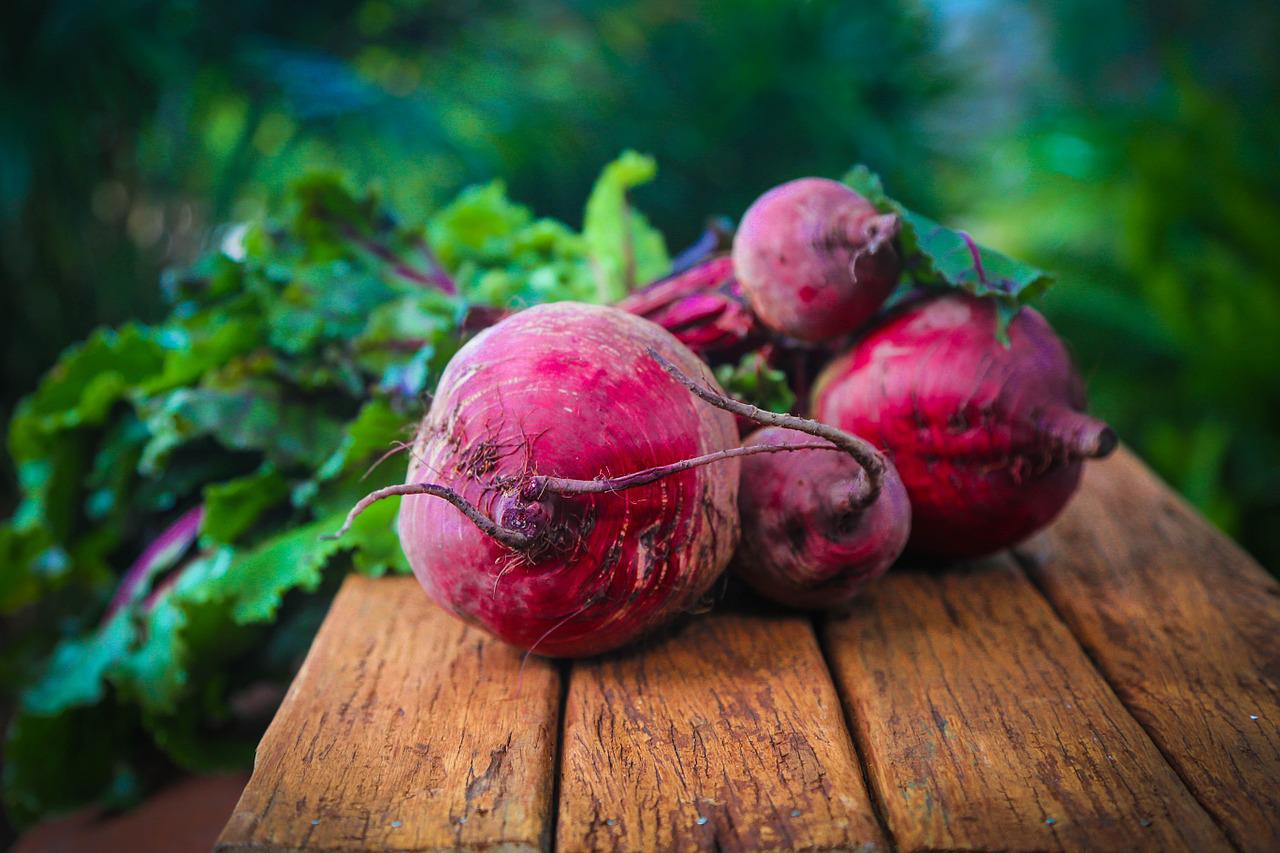They have been a superfood for multiple reasons and are becoming popular for the benefits beetroot provides to health. To understand why beetroot should be considered a superfood, we need to take a look at what the definition of a superfood is: according to Merriam-webster.com, a superfood is “a food (such as salmon, broccoli, or blueberries) that is rich in compounds (such as antioxidants, fiber, or fatty acids) considered beneficial to a person’s health[i].” Taking a closer look at red beetroot, we find that it is a rich source of plant chemical compounds, including ascorbic acid, carotenoids, flavonoids, and phenols. They are also one of a handful of vegetables containing highly active pigments known as betalains. (Betalains tend to have high antioxidant and anti-inflammatory capabilities)[ii] Beets are also high in fiber and contain reasonable amounts of calcium, iron, magnesium, folate, potassium, and manganese. Beetroot also contains nitrates. In the body, nitrate consumption is linked to many benefits.[iii]
Nitrates and their impact on health
Nitrates found in foods will eventually increase the amount of nitric oxide produced in the body. This is NOT nitrous oxide, i.e., “laughing gas,” so please do not confuse them. When the body produces more nitric oxide, we see effects on the cardiovascular system, primarily the blood vessels. Nitric oxide (NO)has been shown to relax the veins and arteries, improve circulation, and reduce blood pressure. NO also provides cardiovascular health by having an impact on decreasing platelets from binding to the lining of your blood vessels.[iv] Other areas of benefit from the increase in NO production are improving oxygen levels in the bloodstream, decreasing muscle fatigue during exercise, improving insulin sensitivity (help with blood sugar), improving cognitive function,[v] and improve blood flow to the brain.[vi]
Other Health Areas Beets Can Help
While NO production appears to be what makes beetroot tick, keep in mind that the vegetable is packed with other nutrients, and therefore we see that this superfood helps in other areas. Check out why:
- Manganese: Contributes to bone health, connective tissue, calcium absorption, regulates blood sugar[vii]
- Vitamin C: This one is already well recognized
- Iron: Important for muscle health, carrying oxygen throughout the body, brain health, and anemia[viii]
- Folate: Important for repairing and making DNA, decreasing fatigue, improving concentration, cardiovascular health, immune health, cognitive function, and nervous system support.[ix]
- Fiber: Great for most aspects of health
- Potassium: cardiovascular health, bone health, kidney health, and muscle relaxation/contraction[x]
- Sex Life: Yes, not a nutrient to define, but due to beetroot impacting circulation, they help improve blood flow to your genital region.
- Liver Health: I love to eat beets for this reason alone. Beetroot is often considered a great detoxifier of the body due to its impact on the liver[xi]
Summing up the potential health benefits of beetroot:
- Cardiovascular Health (multiple reasons)
- Brain Health (Improved circulation, nutritional support, cognition, protection)
- Liver Health (Detoxifying)
- Bone Health
- Mental Health
- Eye Health
- Immune Health
- Fatigue
- Exercise (stamina, fatigue, recovery)
- Antioxidant
Short and Sweet: Beetroot is a SUPERFOOD
Consuming Beets: An Acquired Taste
Face it; not everyone likes the smell or taste of beets. I love them. I cook them in advance, put them in a container, and eat a few daily with some goat cheese, a sprinkle of balsamic vinegar, and pepper. A family member claims they are “allergic to beets,” which means she hates them. For those who fall into I would rather not eat my beets but would LOVE to get the excellent health benefits of this SUPERFOOD, I suggest looking for a powdered form of beets.
Conclusion
If you want to help improve your health and add more SUPERFOODS to your daily diet (or supplement) regimen, beetroot (beets) is an excellent start. Considering the vast number of impact areas on health, beets will become even more popular over the next decade.
[i] “Superfood.” Merriam-Webster.com Dictionary, Merriam-Webster, https://www.merriam-webster.com/dictionary/superfood. Accessed 17 May. 2022.
[ii] Clifford T, Howatson G, West DJ, Stevenson EJ. The potential benefits of red beetroot supplementation in health and disease. Nutrients. 2015;7(4):2801-2822. Published 2015 Apr 14. doi:10.3390/nu7042801
[iii] Bondonno CP, Liu AH, Croft KD, et al. Absence of an effect of high nitrate intake from beetroot juice on blood pressure in treated hypertensive individuals: a randomized controlled trial. Am J Clin Nutr 2015;102:368-75.
[iv] Lidder S, Webb AJ. Vascular effects of dietary nitrate (as found in green leafy vegetables and beetroot) via the nitrate-nitrite-nitric oxide pathway. Br J Clin Pharmacol. 2013;75(3):677-696. doi:10.1111/j.1365-2125.2012.04420.x
[v] Clifford T, Howatson G, West DJ, Stevenson EJ. The potential benefits of red beetroot supplementation in health and disease. Nutrients. 2015;7(4):2801-2822. Published 2015 Apr 14. doi:10.3390/nu7042801
[vi] Clifford T, Howatson G, West DJ, Stevenson EJ. The potential benefits of red beetroot supplementation in health and disease. Nutrients. 2015;7(4):2801-2822. Published 2015 Apr 14. doi:10.3390/nu7042801
[vii] Institute of Medicine (US) Panel on Micronutrients. Dietary Reference Intakes for Vitamin A, Vitamin K, Arsenic, Boron, Chromium, Copper, Iodine, Iron, Manganese, Molybdenum, Nickel, Silicon, Vanadium, and Zinc. Washington (DC): National Academies Press (US); 2001. 10, Manganese. Available from:
[viii] Abbaspour N, Hurrell R, Kelishadi R. Review on iron and its importance for human health. J Res Med Sci. 2014;19(2):164-174.
[ix] NIH Website, https://ods.od.nih.gov/factsheets/Folate-HealthProfessional/, Folate: Fact Sheet for Health Professionals, Updated March 29, 2021, accessed May 16, 2022
[x] Weaver CM. Potassium and health. Adv Nutr. 2013;4(3):368S-77S. Published 2013 May 1. doi:10.3945/an.112.003533
[xi] Váli L, Stefanovits-Bányai E, Szentmihályi K, Fébel H, Sárdi E, Lugasi A, Kocsis I, Blázovics A. Liver-protecting effects of table beet (Beta vulgaris var. rubra) during ischemia-reperfusion. Nutrition. 2007 Feb;23(2):172-8. doi: 10.1016/j.nut.2006.11.004. PMID: 17234508

